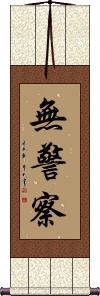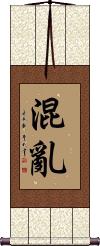Many custom options...
And formats...

Not what you want?
Try other similar-meaning words, fewer words, or just one word.
Feel free to email me with your request. If it's easy, I'll translate it for free and add it to this database of calligraphy for you.
State of Anarchy in Chinese / Japanese...
Buy a State of Anarchy calligraphy wall scroll here!
Personalize your custom “State of Anarchy” project by clicking the button next to your favorite “State of Anarchy” title below...
State of Anarchy
無警察 means the state of anarchy.
More literally it means “without rules or judges.”
This combination of characters makes sense in Korean and Chinese but with a meaning closer to “without police.” 無警察 is kind of a weird selection for a wall scroll and a rather obscure idea (a couple of customers begged for this term, so we added it).
Chaos / Anarchy / Confusion / Mayhem
The first character means confused, dirty, muddy, or mixed.
The second character means confusion and disorder.
Together, these characters mean chaos and sometimes extended to mean a type of anarchy.
This term is often used in a less-than-literal term to describe anything in disarray. Someone might use this word in a sentence like, “My kitchen is in a state of chaos” or “my life is so chaotic.”
![]() Please note that Japanese use an alternate/simplified version of the second character of chaos - it also happens to be the same simplification used in mainland China. Click on the character to the right if you want the Japanese/Simplified version of this two-character chaos calligraphy.
Please note that Japanese use an alternate/simplified version of the second character of chaos - it also happens to be the same simplification used in mainland China. Click on the character to the right if you want the Japanese/Simplified version of this two-character chaos calligraphy.
Not the results for state of anarchy that you were looking for?
Below are some entries from our dictionary that may match your state of anarchy search...
| Characters If shown, 2nd row is Simp. Chinese |
Pronunciation Romanization |
Simple Dictionary Definition |
無警察 see styles |
mukeisatsu / mukesatsu むけいさつ |
More info & calligraphy: State of Anarchy |
無政府状態 see styles |
museifujoutai / musefujotai むせいふじょうたい |
anarchy; state of anarchy |
The following table may be helpful for those studying Chinese or Japanese...
| Title | Characters | Romaji (Romanized Japanese) | Various forms of Romanized Chinese | |
| State of Anarchy | 無警察 无警察 | mukeisatsu | wú jíng chá wu2 jing2 cha2 wu jing cha wujingcha | wu ching ch`a wuchingcha wu ching cha |
| Chaos Anarchy Confusion Mayhem | 混亂 混乱 | kon ran / konran | hùn luàn / hun4 luan4 / hun luan / hunluan | |
| In some entries above you will see that characters have different versions above and below a line. In these cases, the characters above the line are Traditional Chinese, while the ones below are Simplified Chinese. | ||||
Successful Chinese Character and Japanese Kanji calligraphy searches within the last few hours...





